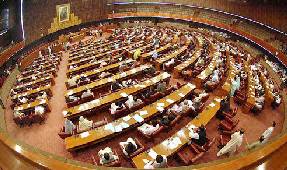
Just as one writes these lines, a meeting of the Parliamentary Committee on National Security on “current issues of national security” was in progress in Islamabad. It is an in-camera meeting. Nothing will be publicly known about it, except perhaps for a feel-good press note acknowledging the briefing given to the political leadership.
The most current security issue facing Pakistan is the Afghanistan crisis and it is safe to assume that the meeting was mostly, if not all, about the risks and opportunities presented by the situation.
The meeting is timed just when Afghan government announced “national mobilization” to arm local volunteers and armed militias in preparation for the onslaught of Taliban indicating the feared breakdown of Afghan security forces. The unfolding scenario, namely the absence of political consensus in Afghanistan, breakdown of Afghan security forces, arming militias, resulting in civil war and influx of refugees into Pakistan does present a potent security threat.
While one cannot comment on what transpired in the meeting, not merely because invitation to the writer was withdrawn hours before it started, but also due to its in camera nature, it is inevitable to comment on the Afghan crisis and the dynamics leading up to Thursday’s huddle in the Parliament House.
A day before the meeting, the army chief, while addressing the National Defence University (NDU), said, “A well-equipped, trained and motivated army having unwavering support of its people can surmount any challenge.” Almost simultaneously, Prime Minister Imran Khan said in the National Assembly in a ‘same page’ reiteration that Pakistan “did not seek strategic depth or choice government in Afghanistan.” Placed in juxtaposition, these are important statements in the context of the national security meeting.
The purpose of Thursday’s meeting, therefore, is much more than a mere briefing of the parliamentarians. It is to secure “unwavering support” of political parties represented in the Parliament to the narrative of the security establishment. What is this narrative?
From the public statements of the prime minister, some federal ministers and official spokespersons from time to time, it is easy to guess. While it cannot be asserted that this was formally presented at Thursday’s meeting, it is helpful to describe it briefly thus.
The Tehrik Taliban Afghanistan (TTA) is a recognized political reality. It is no longer a stranger to the world. The world’s super power is talking with them. All regional countries want to have relations with them.
The TTA is armed and has tens of thousands of fighters. Taliban have been absorbed in the Pakistani society and it was not possible to extricate them from their entrenched positions. It has structures of shadow government operating from within Afghanistan and it is financially self-reliant.

The allegations of strategic depth or waging of proxy wars in Afghanistan are wrong and part of the 5-G war against Pakistan. These Taliban who control 30 percent of Afghan territory do not need space in Pakistan, nor does the nuclear state need strategic depth any longer.
President Ashraf Ghani is responsible for the breakdown of peace talks as the TTA has rejected Ghani’s peace plan. Insurgents in Balochistan are supported by operatives in Afghanistan and former tribal areas. Pakistan has a key role in the peace process and it has no favorites in Afghanistan anymore. As much as 85 percent of the border with Afghanistan has been fenced, while fencing of the border with Iran continues.
The political parties and the parliament were, therefore, on trial on Thursday. Whether they accepted ‘hook, line and sinker’ this national security narrative or they had worked on an alternate narrative may not be known for some time.
The political parties should have demanded an open joint session of the parliament to articulate their stance in full public view and not in closed door meetings in which they are lectured with ball point presentations.
Pakistan is facing an existential threat and it is important that people get to know who stands where. If that could not be done, they must at least be careful in how an agreed statement is issued after the closed-door meeting. Blindly accepting a given narrative might suit some but cannot form the basis of a sound policy.
The political parties have a responsibility to contribute to national security discourse. But they should not be used as posts by the security establishment to lean on when their policies devised in dark rooms go awry. If the files of Afghanistan, India and nuclear had not been missing from Parliament and the Foreign Office and if the state institutions had been allowed to function normally, it would have been less difficult to address the current security situation and Pakistan would not have come to such a pass.
From Pakistan’s perspective, the greatest security risk today is not the imminent influx of millions of more refugees. That is not unmanageable. The greatest security risk today is the miscalculation both by Taliban and their backers in Pakistan that first they defeated the Soviets and now have also defeated the US. Thankfully the army’s motto of ‘faith, piety and jehad in the cause of Allah’ adopted during General Zia’s time has been quietly abandoned. But the fear that it may still continue to inspire some is a great security threat.
Pakistan’s tightrope walk is not just to take no sides in the Afghan war. Pakistan must also not be seen to be taking sides. Unfortunately, this is not the case. The perception of elaborate support infrastructures in Pakistan for the Taliban lingers. How else does one explain that ex-tribal zones are treated as no-go areas despite merger in the province? Thursday’s meeting would be a resounding success if it arrived at consensus on how to address this perception.
The writer is a former senator
The most current security issue facing Pakistan is the Afghanistan crisis and it is safe to assume that the meeting was mostly, if not all, about the risks and opportunities presented by the situation.
The meeting is timed just when Afghan government announced “national mobilization” to arm local volunteers and armed militias in preparation for the onslaught of Taliban indicating the feared breakdown of Afghan security forces. The unfolding scenario, namely the absence of political consensus in Afghanistan, breakdown of Afghan security forces, arming militias, resulting in civil war and influx of refugees into Pakistan does present a potent security threat.
While one cannot comment on what transpired in the meeting, not merely because invitation to the writer was withdrawn hours before it started, but also due to its in camera nature, it is inevitable to comment on the Afghan crisis and the dynamics leading up to Thursday’s huddle in the Parliament House.
A day before the meeting, the army chief, while addressing the National Defence University (NDU), said, “A well-equipped, trained and motivated army having unwavering support of its people can surmount any challenge.” Almost simultaneously, Prime Minister Imran Khan said in the National Assembly in a ‘same page’ reiteration that Pakistan “did not seek strategic depth or choice government in Afghanistan.” Placed in juxtaposition, these are important statements in the context of the national security meeting.
Political parties should have demanded an open joint session of the parliament to articulate their stance in full public view
The purpose of Thursday’s meeting, therefore, is much more than a mere briefing of the parliamentarians. It is to secure “unwavering support” of political parties represented in the Parliament to the narrative of the security establishment. What is this narrative?
From the public statements of the prime minister, some federal ministers and official spokespersons from time to time, it is easy to guess. While it cannot be asserted that this was formally presented at Thursday’s meeting, it is helpful to describe it briefly thus.
The Tehrik Taliban Afghanistan (TTA) is a recognized political reality. It is no longer a stranger to the world. The world’s super power is talking with them. All regional countries want to have relations with them.
The TTA is armed and has tens of thousands of fighters. Taliban have been absorbed in the Pakistani society and it was not possible to extricate them from their entrenched positions. It has structures of shadow government operating from within Afghanistan and it is financially self-reliant.

The allegations of strategic depth or waging of proxy wars in Afghanistan are wrong and part of the 5-G war against Pakistan. These Taliban who control 30 percent of Afghan territory do not need space in Pakistan, nor does the nuclear state need strategic depth any longer.
President Ashraf Ghani is responsible for the breakdown of peace talks as the TTA has rejected Ghani’s peace plan. Insurgents in Balochistan are supported by operatives in Afghanistan and former tribal areas. Pakistan has a key role in the peace process and it has no favorites in Afghanistan anymore. As much as 85 percent of the border with Afghanistan has been fenced, while fencing of the border with Iran continues.
The political parties and the parliament were, therefore, on trial on Thursday. Whether they accepted ‘hook, line and sinker’ this national security narrative or they had worked on an alternate narrative may not be known for some time.
The political parties should have demanded an open joint session of the parliament to articulate their stance in full public view and not in closed door meetings in which they are lectured with ball point presentations.
Pakistan is facing an existential threat and it is important that people get to know who stands where. If that could not be done, they must at least be careful in how an agreed statement is issued after the closed-door meeting. Blindly accepting a given narrative might suit some but cannot form the basis of a sound policy.
The political parties have a responsibility to contribute to national security discourse. But they should not be used as posts by the security establishment to lean on when their policies devised in dark rooms go awry. If the files of Afghanistan, India and nuclear had not been missing from Parliament and the Foreign Office and if the state institutions had been allowed to function normally, it would have been less difficult to address the current security situation and Pakistan would not have come to such a pass.
From Pakistan’s perspective, the greatest security risk today is not the imminent influx of millions of more refugees. That is not unmanageable. The greatest security risk today is the miscalculation both by Taliban and their backers in Pakistan that first they defeated the Soviets and now have also defeated the US. Thankfully the army’s motto of ‘faith, piety and jehad in the cause of Allah’ adopted during General Zia’s time has been quietly abandoned. But the fear that it may still continue to inspire some is a great security threat.
Pakistan’s tightrope walk is not just to take no sides in the Afghan war. Pakistan must also not be seen to be taking sides. Unfortunately, this is not the case. The perception of elaborate support infrastructures in Pakistan for the Taliban lingers. How else does one explain that ex-tribal zones are treated as no-go areas despite merger in the province? Thursday’s meeting would be a resounding success if it arrived at consensus on how to address this perception.
The writer is a former senator

